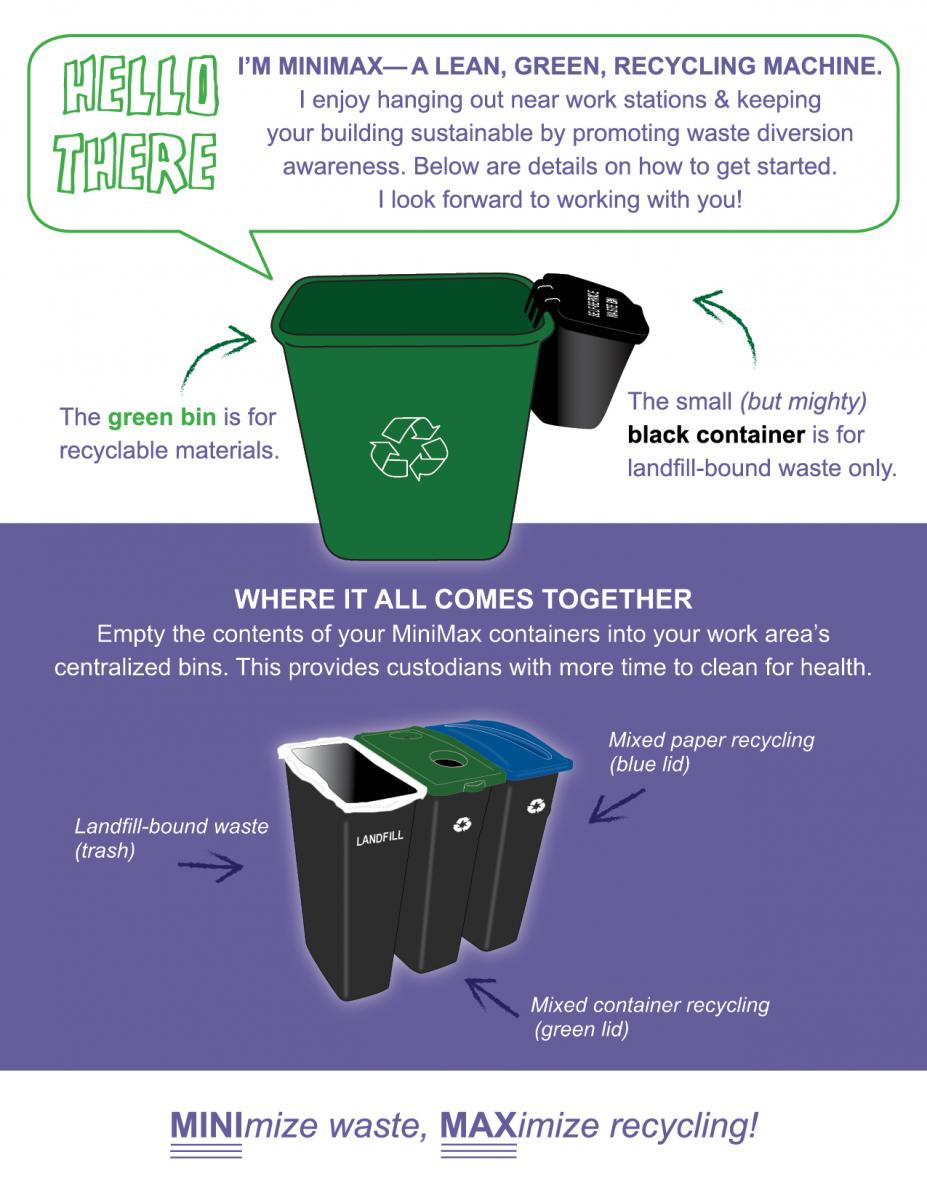
With the City of Seattle’s new compost ordinance in effect, UW Recycling is, more than ever, a pivotal waste diversion resource on campus.
As of January 1, Seattle prohibits food waste from garbage destined for the landfill. The University of Washington is dedicated to waste reduction, and composting and recycling at the University is designed to be visible, convenient and to maximize the recovery of waste. UW Recycling's MiniMax program, the desk-side, self-service waste collection system, supports UW’s observance of the compost ordinance by providing food waste containers within administrative and academic buildings across campus.
 In 2014, the amount of food waste collected on UW’s Seattle campus increased month-over-month as more buildings adopted MiniMax. As of March 2015, more than half of campus buildings have adopted the MiniMax program, and the food waste collected from the academic and administrative side of campus now makes up 52% of total tonnage of campus food waste collected. Staff and faculty are responsible for emptying their office MiniMax bins into centralized recycling, compost and garbage containers (which are then serviced by custodians). The self-service model builds awareness around recycling and promotes personal responsibility for waste generation. Since the desk-side MiniMax bins are unlined, the program also significantly reduces the number of plastic liners that go to the landfill.
In 2014, the amount of food waste collected on UW’s Seattle campus increased month-over-month as more buildings adopted MiniMax. As of March 2015, more than half of campus buildings have adopted the MiniMax program, and the food waste collected from the academic and administrative side of campus now makes up 52% of total tonnage of campus food waste collected. Staff and faculty are responsible for emptying their office MiniMax bins into centralized recycling, compost and garbage containers (which are then serviced by custodians). The self-service model builds awareness around recycling and promotes personal responsibility for waste generation. Since the desk-side MiniMax bins are unlined, the program also significantly reduces the number of plastic liners that go to the landfill.
MiniMax started out simply as a model of sustainability to raise awareness about personal waste generation but has quickly evolved into a campus-wide waste diversion program that has helped standardize recycling and composting infrastructure across campus, including restroom paper towel composting. When a building is converted to the MiniMax system, the entire building’s waste infrastructure is reviewed and bins are moved, removed or added to allow for best coverage. The goal is to ensure that adequate recycling, compost and garbage containers are provided in common areas so students, faculty and staff can make proper waste diversion choices. This is extremely important because 95% of consumer waste at UW is recyclable or compostable.
These efforts support UW’s sustainability mandate, and also contributes to UW Recycling saving the University over $1.8 million dollars in annual disposal costs. According to Ruth Johnston, Associate Vice President for UW Sustainability and Planning & Management Chief of Staff, “diverting our waste supports UW’s sustainability goals, while providing real cost-savings to the University, and these are hard dollars that add up. The MiniMax program is an opportunity to have each member of the University do their part to minimize landfill waste.”
An added benefit of the self-service model is the per-day time savings for each Custodial Services staff member, which allows for more time to be spent on essential cleaning tasks.
"There are over 10,000 offices on campus, so there is significant potential with the MiniMax program to improve the level of cleaning custodians are able to provide on a daily basis," said Gene Woodard, Director of the Building Services Department. "When custodians do not have to spend a vast amount of their time entering individual offices to check for what typically amounts to a small amount of trash, they are able to concentrate more of their time on critical cleaning tasks that contribute to a healthful and pleasant indoor environment such as vacuuming, disinfecting human touch points, dusting and project cleaning."
By observing Seattle’s compost ordinance and implementing the MiniMax program, the University community is helping UW Recycling work toward its waste diversion goal of 70% by 2020.